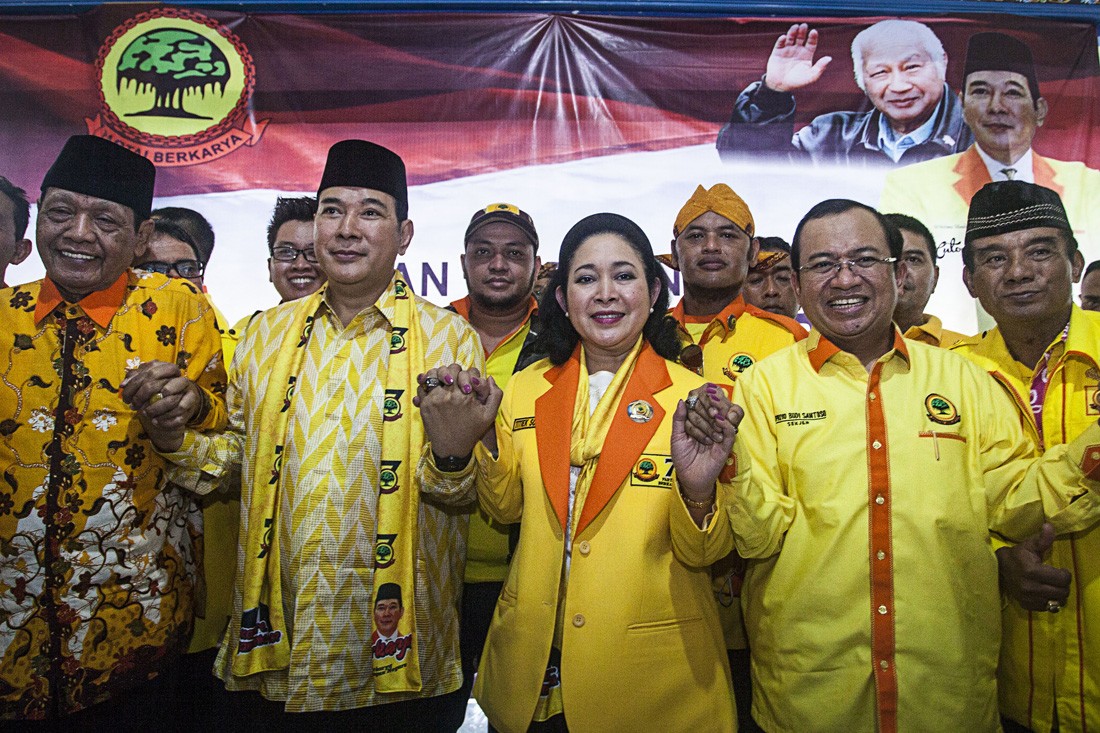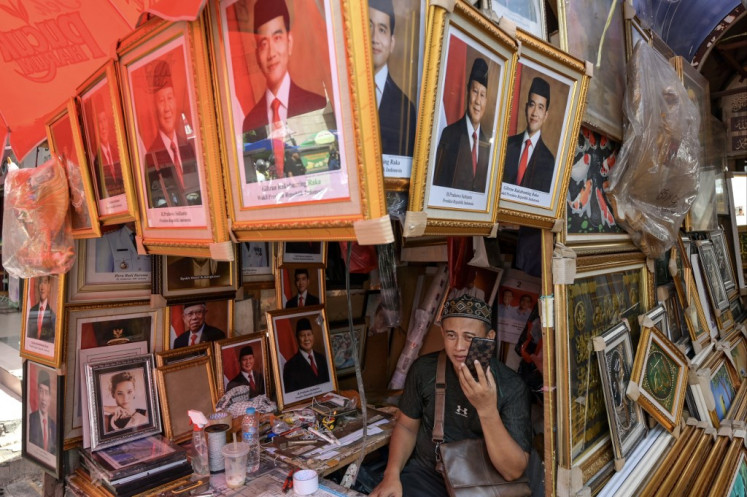Commentary: Party switching shows politicians' lack of integrity
19 political bigwigs changed sides. NasDem is the most favorited haven, receiving 15 switchers.
Change Size
 New ally: Berkarya Party chairman Hutomo Mandala Putra alias Tommy Soeharto (second left), the party's secretary general Priyo Budi Santoso (second right), and new cadre Titiek Soerharto (center), and a number of party members, take a picture after a press conference in Bantul, Yogyakarta, on June 11. (Antara/Andreas Fitri Atmoko)
New ally: Berkarya Party chairman Hutomo Mandala Putra alias Tommy Soeharto (second left), the party's secretary general Priyo Budi Santoso (second right), and new cadre Titiek Soerharto (center), and a number of party members, take a picture after a press conference in Bantul, Yogyakarta, on June 11. (Antara/Andreas Fitri Atmoko)
O
pportunistic politicians have been switching allegiance from one party to another since the wake of strongman Soeharto’s downfall in 1998, but never had this political circus stirred as much controversy as it has in recent weeks.
In the past, politicians left their old parties and joined a new one en masse as part of the euphoria that came along with newfound political freedom. Soeharto’s New Order regime allowed only three political parties: Golkar as his re-election machine and two pseudo-oppositions, namely the Muslim-based United Development Party (PPP) and nationalist Indonesian Democratic Party (PDI).
Back then, many Golkar politicians jumped to the mushrooming political parties they thought would be more propitious, thinking their stigmatized old party would go to the trash bin of history.
They were wrong. Thanks to its unwaveringly dedicated leaders, Golkar surprised even the most optimistic by finishing as runner-up in the 1999 general election after the Indonesian Democratic Party of Struggle (PDI-P). It even won the 2004 election and has remained the second-largest party until today.
Now that Indonesia enjoys greater political freedom, with 16 national political parties plus four local parties in Aceh contesting next year, party switching sounds like the multi-million transfer of professional soccer players in Europe.
As the registration for new House of Representatives members closed last week, it became public that 19 political bigwigs changed sides. NasDem is the most favorited haven, receiving 15 switchers.
Among the best-known names are Yusuf Supendi, a co-founder of the Islamist Prosperous Justice Party (PKS) who moved to the nationalist PDI-P; Syarifuddin Suding from the Hanura Party to the National Mandate Party (PAN); ex-model Okky Asokawati from the PPP to NasDem; and Soeharto’s daughter Siti Hediati from Golkar joined the Berkarya Party founded by her younger brother Hutomo “Tommy” Mandalaputra.
The changes take place as pollsters reflect pessimism about small parties’ performance in next year’s general elections. The Indonesian Survey Institute (LSI), for example, came out with the chilling conclusion that five of the 10 older parties — the PPP, PKS, PAN, Hanura and NasDem — may not win any seats in the House.
Their chances shrank after new laws raised the minimum threshold to 4 percent of the national vote from 3.5 percent set for the 2014 election, as well as the emergence of new political parties with platforms more appealing to younger voters, such as the Indonesian Solidarity Party (PSI).
The opportunists see a better chance of winning seats under other parties that give them red-carpet treatments. They may secure a top slot on the new parties’ list of favored candidates in recognition of their tested expertise, experience and popularity. Hence, hiring experienced lawmakers is a shortcut for wealthy but lethargic parties in recruiting seasoned politicians.
In the short term, these opportunistic lawmakers leave behind a mess. They have to quit their old political parties and the legislative body at the same time. Then, their parties will have to scramble for substitutes to fill the vacant seats. All the rush and inexperience of new recruits will likely serve nothing but further slow down the House’s work.
The recent party switching has already heightened tensions among political parties. PAN has openly alleged that NasDem bought its celebrity-cum-lawmaker Lucky Hakim for Rp 5 billion (US$345,212). Predictably, NasDem denies the allegations.
It is intriguing that NasDem, the second-smallest of the 10 political parties with 35 seats in the House, has become the most popular destination for jittery politicians who lost confidence in their old parties. Besides, some pollsters doubt NasDem would be able to survive next year’s election. So, it’s only logical that its sudden appeal is giving rise to wild speculations, mainly the money factor.
Hanura, the party founded by former army general Wiranto, now the coordinating political, legal and security affairs minister, lost the most with eight lawmakers leaving as the result of its unresolved internal conflict that has already split its top leadership, potentially eroding its electability.
Even though Indonesia’s legal system does not restrict anybody from switching political parties, the ongoing trend is provoking questions of integrity among our politicians already infamous for their pragmatism.
Politicians moving to other parties, obviously, have ethical issues. They miserably fail and betray voters who trusted them to defend their interests. Leaving constituents when the promised job is far from over for the sake of their personal gains is a show of dishonesty.
The phenomena also disclose political parties’ inability to manage internal bickering and instill their ideology among members, common failures contributing to pragmatism and corruption that poison democracy.
The transfer of politicians and recruitment of celebrities as vote-getters are cheap tactics that hamper the recruitment of truly capable and loyal career politicians and provide fertile ground for breeding internal conflicts.
A plausible measure that may help stem the tide is to have a rule that sets the minimum number of years for a public official to serve in a political party before they can be eligible to contest for a public post.










